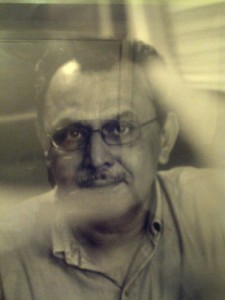Children of a lesser god : Prof Sibte Jafar – by Abbas Nasir
A college principal, Prof Sibte Jafar, who was riding home on a rickety motorcycle, was slowing down at a speed breaker when waiting (Takfiri deobandi) killers fired at him. His grievous injuries took his life probably even before the educationist hit the ground. Who cares why a senior professor, who spread light to hundreds of students in middle-class Liaquatabad, talked of religious and sectarian harmony on the media and was one of the leading exponents of soz-salaam (elegy) was targeted? Perhaps, because he didn’t make friends in high places, lived a down-to-earth, extremely frugal life and was content with living within his means. Otherwise, his fate would have been different.
It was last Monday afternoon when, having just crossed Karachi’s Clifton Bridge heading towards the salubrious part of town near the sea, heavy traffic slowed us down. The policemen manning the intersection ahead were trying hard to clear the road.Their task was rendered an extra urgency by the obnoxious blaring of the siren by the police vehicle in front of a dark SUV. This sort of nuisance is such an everyday occurrence in the metropolis that one tends to ignore it.Yes, ignore it for doing anything else would seriously jeopardise one’s health, limb, liberty and who knows even life. But this particular cluster of vehicles couldn’t be ignored. The VIP was so well-protected.
The SUV was boxed in by two twin cabin 4X4s with a number of private guards who looked edgy, nervous and fidgety. That they held automatic weapons in their hands with seemingly twitchy trigger fingers didn’t inspire confidence in all those who were stuck in that traffic jam close to the VIP.I did notice who was travelling in the SUV but couldn’t understand why the guards seemed so flushed with adrenaline. Much later, in fact, in the evening when I switched on the TV set I understood why. Interestingly, as the TV report on the fight between outgoing Sindh minister Agha Siraj Durrani and his department’s secretary was being run on a news channel, I realised I could tell a couple of his guards from earlier that day.Although the former minister denied the charge as a malicious attempt to defame him and registered a counter-case against the civil servant, the latter insisted that Mr Durrani and members of his entourage had roughed him up.The incident was allegedly triggered by the secretary’s refusal to oblige the minister who, on his final day in office before the dissolution of the Sindh Assembly, wanted to get dozens of employment orders signed.
We can’t say any more on the merits of the secretary’s and/or the minister’s case and counter-case against each other alleging violation of law and assault. The matter will be heard and decided in a court of law.The tall and fiery-tempered Siraj Durrani was known as an action man in his youth as well. It was his robustness that won him the undying loyalty and friendship of someone who was destined to occupy the highest office in the land.Many people in Karachi during the 1970s would have been aware of the tense standoffs at Hotel Metropole’s Samar (club) between the scions of the Bugti and Zardari families.Many of these arguments and fights were contained within its four walls but some spilled out of the club too. It was on one such day that the Bugti scion seemed better prepared for a fight than the Zardari pride.The argument which started at the club ended, after a car chase, at a house in the PECHS area where one Agha Siraj Durrani refused to abandon his ill-prepared friend. Rifle in hand he took position on the rooftop.
Third-party intervention may have prevented further escalation and a possible gunfight, but not before the Zardari scion was totally taken by the courage of his friend. As is his wont, he never forgot this favour.Once in power, he rewarded the loyal friend by ensuring he got key provincial departments/ministries that insiders describe, a shade unkindly perhaps, as “lucrative”. It was clearly thought there was nothing wrong in doing this.Starting in 1988, whenever the party came into power, though he was never made chief minister, it was clear to one and all in the Sindh set-up that Durrani would enjoy extraordinary powers; that he was no ordinary minister.Immense wealth and power are a heady mix and, it is possible, made the minister lose patience with the bureaucrat in charge of the department where it was the minister’s last day in office.Contrast this with Prof Sibte Jafar. Thousands turned up for his funeral, a large number of his students among them, with tears running down their cheeks. He was admired for his intellect and his excellence in what is a devotional art form.He did not move in a convoy comprising many open-top vehicles carrying dozens of guards toting automatic weapons.Thousands may have loved him but none could prevent his tragic, senseless murder in broad daylight.For the mild-mannered, soft-spoken professor was an ordinary citizen. His education and intellect may have entitled him to much more somewhere else but where personal loyalties are paramount he was a non-entity.Like dozens, hundreds, even thousands, before him he was left unprotected by the state to be killed on the streets by anyone who chose to. He was a “nobody”. He hadn’t raced up the stairs of a PECHS house with a gun in hand and crouched behind the parapet to protect another like himself born to privilege and magically multiplying riches.
A piece in yesterday’s Dawn carried the headline: ‘A tale of two cities’. I don’t think I can better that.


Shaheed Jafar, May Allah accept his Shahadat.